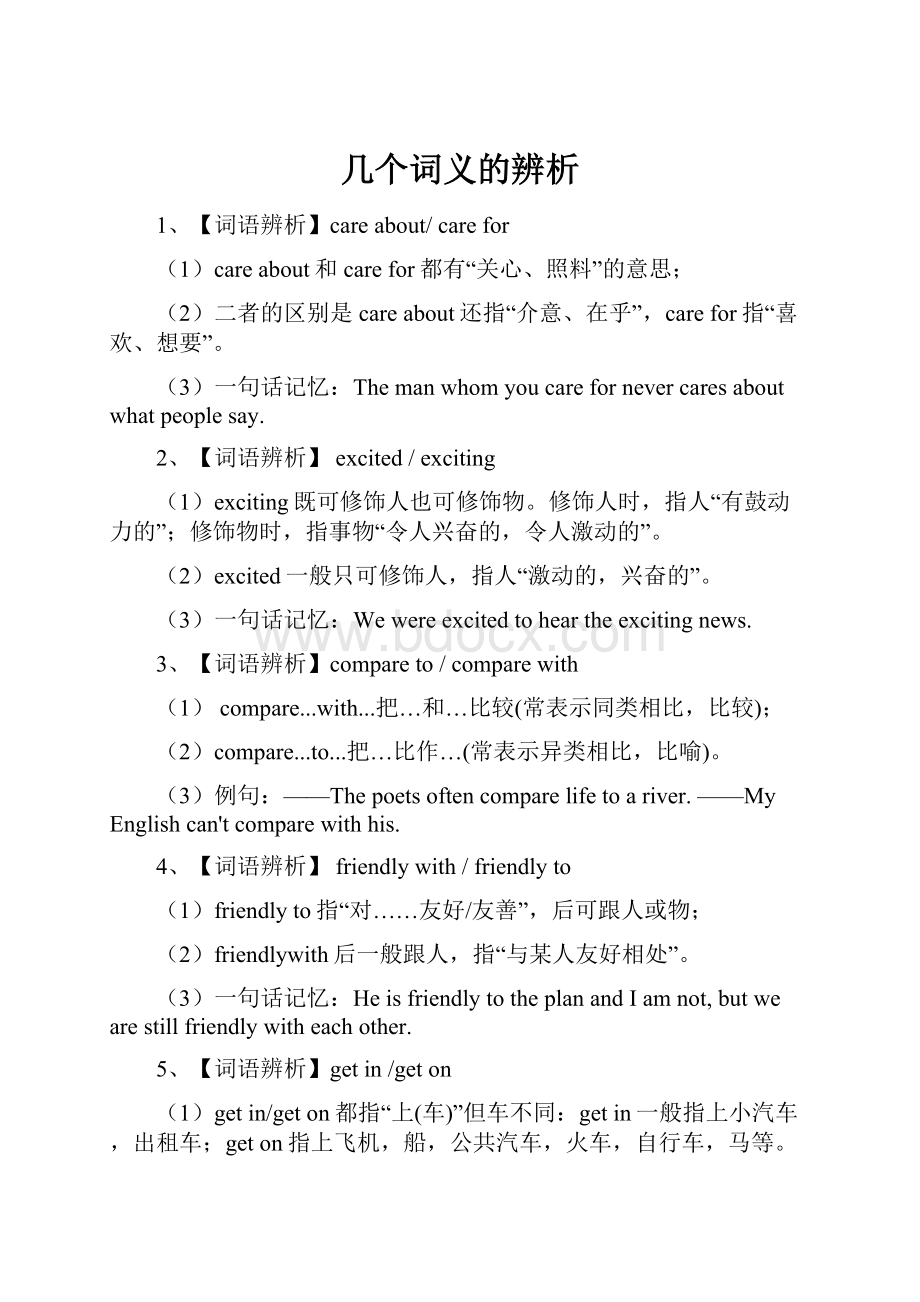几个词义的辨析.docx
《几个词义的辨析.docx》由会员分享,可在线阅读,更多相关《几个词义的辨析.docx(15页珍藏版)》请在冰豆网上搜索。

几个词义的辨析
1、【词语辨析】careabout/carefor
(1)careabout和carefor都有“关心、照料”的意思;
(2)二者的区别是careabout还指“介意、在乎”,carefor指“喜欢、想要”。
(3)一句话记忆:
Themanwhomyoucarefornevercaresaboutwhatpeoplesay.
2、【词语辨析】excited/exciting
(1)exciting既可修饰人也可修饰物。
修饰人时,指人“有鼓动力的”;修饰物时,指事物“令人兴奋的,令人激动的”。
(2)excited一般只可修饰人,指人“激动的,兴奋的”。
(3)一句话记忆:
Wewereexcitedtoheartheexcitingnews.
3、【词语辨析】compareto/comparewith
(1)compare...with...把…和…比较(常表示同类相比,比较);
(2)compare...to...把…比作…(常表示异类相比,比喻)。
(3)例句:
——Thepoetsoftencomparelifetoariver.——MyEnglishcan'tcomparewithhis.
4、【词语辨析】friendlywith/friendlyto
(1)friendlyto指“对……友好/友善”,后可跟人或物;
(2)friendlywith后一般跟人,指“与某人友好相处”。
(3)一句话记忆:
HeisfriendlytotheplanandIamnot,butwearestillfriendlywitheachother.
5、【词语辨析】getin/geton
(1)getin/geton都指“上(车)”但车不同:
getin一般指上小汽车,出租车;geton指上飞机,船,公共汽车,火车,自行车,马等。
(2)一句话记忆:
Peoplegettingonabususuallytravelslowerthanthosegettinginacar.
(3)拓展getoff下车。
6、【词语辨析】disappointed与disappointing
(1)disappointing指“令人失望的,令人扫兴的”;
(2)disappointed指某人对他人或某事物“感到失望的”
(3)一句话记忆:
Iamdisappointedtolearnthedisappointingnews.
7、【词语辨析】effect/affect
(1)这两个词都有“影响”的含义;
(2)二者的不同在于:
一词性不同,affect是动词,effect是名词;
(3)二含义有细微差别,affect是因,effect是果。
(4)一句话记忆:
Changesaffectusandsometimesmakeaneffectonourlives.
8、【词语辨析】everyday/everyday
(1)everyday指“每天”,在句中作时间状语;
(2)everyday是形容词,指“每天的,日常的”,在句中作定语。
(3)一句话记忆:
IpracticeeverydayEnglisheveryday.
9、【词语辨析】carryon/carryout
(1)carryon“继续下去,继续开展”;
(2)carryout“开展,执行”。
(3)例子记忆:
1)Nowwecancarryonwithourwork.2)Hewillcarryouthisplan.
10、【词语辨析】forgetdoingsth./forgettodosth
(1)forgetdoingsth.指“忘记做过某事”;
(2)forgettodosth.指“忘记去做某事”。
(3)一句话记忆:
Maryalwaysforgetslockingthedoor,whileDavidforgetstolockit.Whatafunnyandluckycoupletheyare!
11、【词语辨析】clothes,clothing,cloth,dress
(1)clothes复数,不能用来表单件衣服。
(2)clothing只有单数,侧重于笼统指代各种服装衣着用品。
(3)cloth指布料。
(4)dress既可作不可数名词统指“衣服”;也可作可数名词指妇女儿童的服装;还可表示礼服等。
(5)一句话记忆:
Thedressesintheirclothingstoresaredifferentfromourclothes.
12、【词语辨析】dayafterday/daybyday
(1)dayafterday指“日复一日”,强调不变化地重复;
(2)daybyday指“一天一天地,逐渐”,强调逐渐变化的过程。
(3)一句话记忆:
Itwasrainingdayafterdaythewholemonth.Sothewaterlevelintheriverwasrisingdaybyday.
13、【词语辨析】decide/makeupone'smind
(1)decide指根据现有情况,从若干可能中做出选择;
(2)makeupone'smind强调“打定主意,下定决心”。
(3)一句话记忆:
Hedecidestomovetothecountrysideandmakesuphismindtoliveasimplelife.
14、【词语辨析】deep/deeply
(1)deep既可以作形容词也可以作副词,可指空间上和时间上的“深”;
(2)deeply只作副词,用来比喻人在思想上、精神上的“深”,意为“深深地,深切地”。
(3)例句记忆:
a)Wearedeeplymovedbythedeepfeelingbetweenthem. b)Thesnowisthreefeetdeep.
15、【词语辨析】callin,callon,callup
(1)callin“召集”;
(2)callon“拜访,访问”;
(3)callup“号召,打电话”。
(3)例句记忆:
a)Howmanyfriendsdidyoucallin?
b)I'dliketocallonyouthisSunday.c)Shecalledupafriendjustforachat.
16、【词语辨析】catchupwith/comeupwith
(1)catchupwith“赶上”;
(2)comeupwith“提出”。
(3)例句记忆:
a)Ihavetoworkhardtocatchupwiththeotherstudents.
b)Hecouldnotcomeupwithaproperanswer.
17、【词语辨析】fast/quick
(1)fast指运动速度快,可兼作形容词和副词;
(2)quick指在短时间内,快速而敏捷地做出反应。
(3)一句话记忆:
Whichisfaster,atrainoraplane?
Givemeaquickanswer,please.
18、【词语辨析】forthemoment/foramoment
(1)forthemoment指“此刻,暂时”;
(2)foramoment指“一会儿”。
(3)一句话记忆:
Wouldyoupleasewaitformeforamoment,andIambusyandcannotgowithyouforthemoment.
19、【词语辨析】haveawordwith/havewordswith
(1)haveawordwithsb.指“和某人说话”;
(2)havewordswithsb.指“与人争吵”。
记忆方法:
“言多必失”,复数形式即表示争吵。
(3)一句话记忆:
IintendedtohaveawordwithhimontheproblembutwehaddifferentideasandIhadwordswithhim.
20、【词语辨析】haveto/must
(1)haveto和must都有“必须”的意思,但感情色彩有所不同。
(2)haveto指“客观上不得不”;
(3)must指“主观上认为必须怎样”。
(4)一句话记忆:
“Youmustfinishyourhomeworkbeforeyougotoplay”saidmyfather.SoIhadtodoso.
21、【词语辨析】hear,listen(to),hearof
(1)hear指“听到”,强调结果;
(2)listento指“听”,强调动作;
(3)hearof指间接地听到——“听说”。
(4)一句话记忆:
DidyouhearofAnn?
Listen!
Sheissinginginthenextroom.Let'sstoptalkingandlistentoher.Nowcanyouhearher?
22、【词语辨析】hearfrom/hearof(about)
(1)hearof指“听说”,从别人那儿间接得知;
(2)hearfrom指“收到……的来信”。
(3)一句话记忆:
It'ssostrangethatIheardfromamanwhomI'veneverheardof.
23、【词语辨析】getaway,giveaway,giveout
(1)getaway指“逃离”;
(2)giveaway指“赠送,分发”;
(3)giveout指“分发,用尽”。
(
(4)例句记忆:
a)Twooftheprisonersgotaway.
b)Shegaveawayallhermoneytothepoor.
c)MissLiugaveoutthenewbookstoeveryone.
24、【词语辨析】own/personal
(1)personal表示“私人的,个人的”,指含有个性化特点而非群体性所共有,也指“本人所做的;亲身的”;
(2)而own常与形容词性物主代词连用。
(3)一句话记忆:
Iheardherpersonalopinionswithmyownears.
25、【词语辨析】geton(well)with=getalong(well)with
(1)与……相处(融洽)
(2)例句记忆:
Iamsureyou'llgeton/alongwellwithherbecauseofherkindness.
(3)拓展:
其他get相关的词组:
geton“上车”,getoff“下车”,getto“到达”,getup“起床”,gettogether“相聚”,getout“离开,出去”。
26、【词语辨析】high/highly
(1)high除了作形容词外,还可作副词,指具体的高;
(2)highly指抽象概念上的“高度地认识到、高度评价”等,thinkhighlyofsth.“高度评价某人”;thinkhighlyofsth.“高度评价某物”。
(3)一句话记忆:
Hecanjumphighintheraceandsoishighlyspokenof.
27、【词语辨析】infrontof/at(in)thefrontof
(1)infrontof表示“在……(之外)的前面”;
(2)at(in)thefrontof表示“在……(之内)的前面”。
(3)一句话记忆:
Hestandsinthefrontoftheroomlookingatthechildrenplayinginfrontofthehouse.
28、【词语辨析】getthrough/lookthrough
(1)getthrough“通过,拨通(电话)”;
(2)lookthrough“仔细查看,浏览,温习;看穿,从...中显露”。
(3)一句话记忆:
Lookthroughyournotesbeforetheexamination. Ithinkyouwillgetthrough.
(4)拓展:
gothroughv.经历,经受,仔细检查,用完,被通过,参加,搜查,履行(表示“仔细检查”时,目的是为了找出某样东西或者把东西归类。
)
gooverv.(渡过...)转变,(对...进行)仔细检查,润色,但这里人们多用于复习的意思。
(表示检查是,通常“指检查(文件、文字)”等书面材料,达到检查、校对、仔细分析的目的。
)
29、【词语辨析】only/single
(1)only和single都可表示“单个的,唯一的”。
(2)但两者用法有区别:
only只和定冠词the或形容词性物主代词连用;
(3)single只与可数名词单数连用,可以和a连用,也可以和否定词连用,但only不可。
(4)一句话记忆:
a)AmongthemonlyRolynissingle.b)Sheistheonlypersonforthejob.c)Therewasnotasinglepersoninthehouse.
30、【词语辨析】inspired与inspiring
(1)inspired指“受到鼓舞(激励)的”,表示被动意义;
(2)inspiring指“鼓舞人心的”,表示主动意义。
(3)一句话记忆:
Weareinspiredbyhisinspiringwords.
31、【词语辨析】inthetree/onthetree
(1)onthetree指“在树上”,表示属于树的一部分,如花、果、叶等;
(2)inthetree也是“在树上”,但表示不属于树的一部分,只是停留在树上;
(3)一句话记忆:
Thereisaboyinthetreepickingfruitonthetree.
32、【词语辨析】once/ever
(1)once和ever都表示“曾经”。
(2)但once通常用于一般过去时,而ever通常用于完成时及过去时的疑问句。
(3)一句话记忆:
——HaveyoueverbeentoCanada?
——Yes,butonlyonce.
33、【词语辨析】intime/ontime
(1)intime指“及时,提早”;ontime指“准时,按时”。
(2)可用其介词来区分:
intime指在一段时间内,在迟到前,即“及时”;ontime指在规定时间点上,正点,即“准时,按时”。
(3)一句话记忆:
Thefilmwillbeshowedontime.Canyouarriveatthecinemaintime?
34、【词语辨析】join/takepartin
(1)join作及物动词时,后可接人或物。
joinsth.指加入到某一组织,成为其中的一员;joinsb.指和某人共同做某事。
(2)takepartin后只可接物,一般指参加到集体活动中并扮演一定的角色。
(3)一句话记忆:
Afterjoiningthecompany,hetookanactivepartinthegroupwork.
35、【词语辨析】handin/handout
(1)handin指“上交,交纳”,强调亲手交给,还有“把……扶上车”的意思;
(2)handout指“分发”,还有“施舍”的意思。
(3)例句记忆:
a)Wemusthandinthehomeworkontime.b)It'simportanttohandoutourexercisebooksintime.
36、【词语辨析】holiday/vacation
(1)holiday(n.)一般表示时间可长可短的假期,为可数名词。
与季节连用时多用复数;与数词连用时只表示次数,不表示日期。
例句:
Wehavehadthreeholidayssincethebeginningoftheyear.
(2)vacation(n.)一般表示比较长的假期,多指大学的假期、法庭的休庭期。
至于寒、暑假,英国人喜欢用summer/winterholidays;美国人喜欢用summer/wintervacation,两者区别不大。
例句:
Wespentoursummerholidays/vacationinthecountrysidethisyear.
37、【词语辨析】often/usually
(1)often,usually都表示“经常”,但usually表示的行为一般具有规律性,只有特殊情况下才会出现例外;
(2)而often表示的频率还要低些。
(3)一句话记忆:
IntheeveningIoftenreadbooks,butsometimesIgotobedearly.Iusuallygetupearlyinthemorning.
38、【词语辨析】hope/wish
(1)通常情况下,hope后面只能接不定式和that从句,表示一种有信心的、可实现的希望。
例句:
Ihopetoseeyousoon.
(2)wish通常表示某种未实现或无法实现的欲望或希望,wish后跟从句时常用虚拟语气。
例句:
IwishIwereabird.
39、【词语辨析】kindof/alittleof
(1)kindof是日常用语,指“有点儿,有几分”,可以修饰动词;
(2)alittleof修饰名词,表示数量、程度方面的“……中的一点儿”;
(3)一句话记忆:
Ikindofthinkheknowsalittleofeverything.
40、【词语辨析】late/lately
(1)late作形容词指“晚的”,作副词指“迟,晚”。
例如:
Iamlate(adj.).=Icomelate(adv.).
(2)lately副词,指“最近,不久前”,相当于recently。
例句:
Whydoyouoftencomeforschoollatelately?
41、【词语辨析】later/lateron
(1)later和lateron都表示“过后,后来”。
(2)在表示将来时两者可以互换,但指过去的“后来”或表示某段时间后,只能用later。
(3)一句话记忆:
hekeptsilent,butafewminuteslaterhetoldme,“You'llseebyyourselflater(on).”
42、【词语辨析】learn/study
(1)learn指带有模仿性的初学阶段,
(2)study指深入地学习、研究。
(3)一句话记忆:
HebegantolearnChinesefiveyearsagoandnowheisstudyingithard.
43、【词语辨析】leavefor/leave…for
(1)leavefor指“出发去某地”;
(2)leave…for指“离开某地去某地”。
(3)一句话记忆:
TwoyearsagoheleftChinaforAmericaandnowheisleavingforCanada.
44、【词语辨析】let's/letus
(1)let’s包括听话人在内的双方;letus不包括听话人在内。
因此两者的反意疑问句不同;
(2)let’s的反意疑问句为shallwe,letus的反意疑问句为willyou。
(3)一句话记忆:
Wehavefinishedourhomework,andIthinkourmomwillletusgoout.Let'sgoandaskher,shallwe?
45、【词语辨析】lift,raise,rise
(1)lift意为“举起”,指凭借自身的力气或机械举起重量大且看得见的物体;
(2)raise除举起可以看得见的物体外,还指抽象的东西,如地位、价格等的上升,是及物动词;
(3)rise是不及物动词,可指物体升起或物价等上涨。
(4)一句话记忆:
Thesunrises.Studentsraisetheirhandstoanswertheteacher'squestion.Outsidetheclassroomamanisliftingaheavystone
1.receive,accept
(1)receive有“收到”的意思,但不一定接受。
(2)accept是“接受、认可”的意思,是收到并接受。
e.g.Ireceivedalotofgiftsonmybirthday,butIdidn’tacceptany.
2.wear,puton,dress
(1)wear和dress表状态,
(2)wear接衣服等,可用进行时
(3)dress接人。
(4)bedressedin,puton表动作
e.g.It'scoldoutside.Putonyourwarmclothes.
3.listen,hear
(1)listen强调动作;
(2)hear强调结果
e.g.Ilistened,butIheardnothing
4.build,putup,setup,found
(1)build一般用语,建成;
(2)putup临时搭建;
(3)setup建成(内部的设施基本齐全);
(4)found国家或组织的建成putupatent,setupaschool
5.manage,try
(1)managetodo设法做成了某事;
(2)trytodo尽力去做某事但不一定成功
e.g.Hetriedtopasstheexam,buthefaile